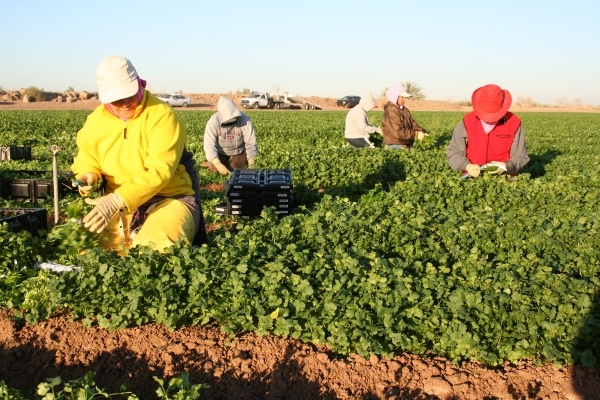
Energy, immigration, and obesity top produce industry issues
Tom Deardorff II, outgoing Western Growers board chair, says the top issues facing the U.S. produce industry are energy, immigration, and obesity.Today, the U.S. imports 64 percent of its energy needs — compared to 36 percent under President Richard Nixon’s administration (1969-1974).An adequate agricultural work force is crucial to a successful U.S. produce industry.
November 18, 2011

Future policies on energy, immigration reform, and obesity are the top three issues that will impact the future of the U.S. produce industry, according to Tom Deardorff II, 2011 Western Growers Board chairman.
“The American public needs to be told the uncomfortable truth that we cannot (continue to) import 64 percent of our energy and have stable economies,” said Deardorff during his Nov.7 chairman’s farewell address at Western Growers' 86th annual meeting in San Diego, Calif.
Every U.S. president since Jimmy Carter — Democrat and Republican — has promised to reduce the country’s foreign energy dependency and each has failed, Deardorff said.
Thirty-six percent of U.S. petroleum needs were imported during President Richard Nixon’s administration. President Jimmy Carter declared foreign oil imports to the U.S. would drop on his watch. It never happened.
Deardorff said increasing energy imports hurt U.S. agriculture and have led to the loss of thousands of human lives through energy-tied wars.
“We (agriculture) all know the financial costs of this — rising fertilizer costs, fuel costs, and other higher-priced inputs. We all know the human toll. We have fought wars and lost thousands of lives due to our lack of energy security.”
Deardorff is president of Deardorff Family Farms, an Oxnard, Calif.-based grower, packer, and shipper of conventional and organic celery, tomatoes, strawberries, and mixed lettuce. He says U.S. energy independence should include continued oil drilling.
“We cannot eliminate all drilling and have energy security,” Deardorff said.
Agriculture is actively implementing technology to reduce foreign energy dependence including solar energy and biofuel production.
“We need to continue to push these,” the fourth-generation farmer said. “Farmers will lead the U.S. toward a new future of energy independence. Our efforts are a start and we need to keep telling our story.”
Thirty-five percent of U.S. world oil production comes from the Middle East and North Africa, Western Growers President and Chief Executive Officer Tom Nassif told the crowd. Saudi Arabia is the No. 1 oil-producing country pumping 10.5 million barrels a day — followed, in order, by Russia, the U.S., China, and Iran.
On the controversial issue of immigration reform, Deardorff says America was founded and built by immigrants who have “enriched and strengthened the fabric of American life.” Yet the U.S. has moved from a country built by immigrants to an anti-immigrant nation.
“This is a problem for our culture, economy, and most importantly for our health and national security,” Deardorff told the crowd of 500. “What happens when we can no longer harvest the produce we need to feed this country?”
An adequate agricultural work force is crucial for a successful produce industry to plant, tend, and harvest fruits and vegetables. Without workers, produce will rot in the fields resulting in increased fresh fruit and vegetable imports. Today, about 35 percent of U.S.-consumed fresh fruits and vegetables are imported.
Deardorff said, “It’s time to hit the panic button. If we are to have a better tomorrow, we need immigration reform that provides access to a reliable and stable workforce to satisfy America’s need to grow and harvest fresh fruits and vegetables.”
On the obesity issue, Deardorff said obesity has reached epidemic status in the U.S. and is tied to 365,000 deaths annually. While life expectancy has increased for decades, several recent studies suggest a decline in life expectancy due to obesity.
“We have to change the environment that our children are living in and the conversation about the foods they eat,” Deardorff said. “Agriculture can lead the change because we have the products that will solve the problem.”
Deardorff gave thumbs up to school gardens, salad bars in schools, and First Lady Michelle Obama’s Let’s Move campaign as effective methods to encourage fruit and vegetable consumption and reduce obesity.
Deardorff turned to the issue of increasingly burdensome regulations. He said local, state, and national government regulations are the number one threat to his family’s farm today. For agriculture, regulations piled on agricultural businesses have increased agricultural costs, delayed or prevented expansion, opened markets to foreign completion, and forced U.S. farmers to relocate farms to other countries.
“Our regulations have absolutely exploded,” Deardorff said. “As farmers we should be worried about the weather, pest and disease pressure, and soil fertility. Unfortunately these major issues have taken a back seat.”
Western Growers has advocated regulatory reform through congressional field hearings in Salinas, Calif., and Washington, D.C. Deardorff said those efforts are paying off through new legislation designed to “rein in” regulatory pressures on agriculture.
Deardorff is the fourth family member to serve on the Western Growers board and the second to serve as the organization’s board chair.
Western Growers, based in Irvine, Calif., is an agricultural trade association whose members in Arizona and California grow, pack, and ship 90 percent of the fresh fruits, nuts, and vegetables grown in California and 75 percent of those commodities in Arizona. This totals about half of the nation’s fresh produce.
You May Also Like



